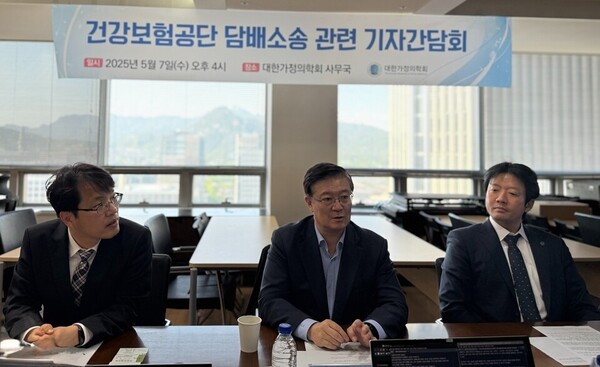Ahead of the National Health Insurance Service’s (NHIS) appeal trial against tobacco companies over damages, family physicians have urged the judiciary to “make a wise decision,” saying tobacco companies should be held accountable for knowingly downplaying or concealing the addictive and harmful effects of tobacco.

Kang Jae-heon, chairman of the Korean Academy of Family Medicine (KAFM), expressed frustration at a press conference on the lawsuit held Wednesday, saying that despite scientific evidence proving that smoking is a fundamental cause of serious illnesses such as cancer and cardiovascular disease, the NHIS is “still losing in court.” The NHIS lost the first trial in 2020 and is currently appealing the decision. Final arguments in the appeal are scheduled for May 22.
“Doctors are the ones who understand all too well how harmful smoking is to people’s health,” Kang said. “Smoking causes serious diseases, reduces quality of life, and places a burden on the national health insurance system, creating broader social and economic costs. It’s a problem that must be addressed.”
Baek Yoo-jin, a professor of family medicine at Hallym University Sacred Heart Hospital, also attended the press conference. She said that as a medical professional, she could not accept the court’s current position that it cannot recognize an individual causal link between smoking and lung cancer. Baek also serves as director of the Southern Gyeonggi Province Tobacco Control Support Center.
“The defense’s argument -- that smoking can’t be considered a cause of lung cancer because non-smokers also develop the disease -- is like saying drunk drivers shouldn’t be punished if they don’t cause an accident,” Baek said. “There are drunk drivers who don’t crash, too. This ruling exposes a serious flaw in the court’s reasoning. The court should determine the percentage of responsibility for smoking-related health harms.”
KAFM said that although smoking cessation treatment and education are being provided to smokers in clinical settings, the court’s ruling undermines the effectiveness of these efforts. The group emphasized the need for the court to side with the NHIS to send a strong anti-smoking message to society.
Han Byoung-duck, director of public relations at KAFM, said, “When I see patients who continue to smoke but are taking medication and losing weight to prevent cardiovascular disease, and their blood test results look fine, it makes me feel like I’m not truly treating them.” He added, “Today alone, I spoke to more than 10 patients about smoking. The government needs to send a clear warning to help people quit.”
KAFM: Appeals court must clarify tobacco companies’ liability
On the same day, KAFM released an official statement urging the judiciary to rule in favor of the NHIS.
“Tobacco companies have long known about the addictive and harmful nature of their products, yet they have downplayed or concealed this information,” the statement read. “By using terms like ‘low tar’ and ‘low nicotine’ to mislead consumers and targeting youth through aggressive marketing strategies, they have pursued massive profits. This goes beyond mere commercial activity—it constitutes systematic deception of the public and a violation of community ethics.”
KAFM also stated, “The judiciary must not issue a ruling that goes against the government’s ongoing anti-smoking policies. Failing to hold tobacco companies accountable would ignore these social efforts and undermine the very purpose of the judiciary.”
“We hope this lawsuit will help clarify the responsibilities of tobacco companies and raise public awareness of the dangers of smoking,” it continued. “We strongly condemn the deceptive actions of tobacco companies and urge the judiciary to make a wise decision to build healthier, smoke-free communities.”
Related articles
- Vivozon’s oral CNS drug curbs smoking cravings without targeting opioid receptors in phase 1
- Men struggle to quit smoking, women to maintain weight: cancer prevention survey
- State health insurer seeks to overturn tobacco ruling with more evidence
- Smoking kills 70,000 Koreans a year, incurring socioeconomic loss of ₩13 tril.: KDCA
- WHO backs Korea’s $38 mil. tobacco lawsuit as Big Tobacco faces global pressure

